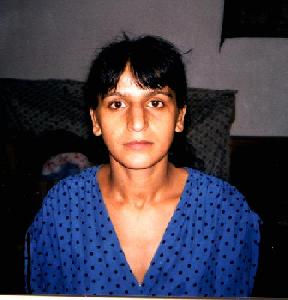Dawn rises over the swamp.
I still know nothing about what the sisters had told each other. Remzija
comes into the room where I am sleeping. She whispers a few, basic words
in German, telling me that Kadri does not know she speaks that language.
She is ready to escape. And she shows me a great bloodstain on the wall
where he had beaten her.
Reska had already figured out the whole situation,
but I was still uncertain whether to believe her or not. Actually, this
was a little unfair on my part: although Reska easily gets lost when trying
to deal with institutions, her ideas are very clear indeed when it comes
to human relations.
Kadri takes us proudly on his car to find
a coffee grinder for the girls' mother, something impossible to get in
Italy. And while I talk with him, Reska - seated behind - deftly puts her
hand into a woman's purse with cosmetics and condoms for Kadri's "worker."
We go back home, with the grinder and a cassette of Albanian war songs.
Reska and I leave. We say goodbye to everybody.
We are going back to Ljubljana, we tell them. Kadri, in German, tells me
loudly that they are a happy family, that I could see it for myself. And
I - after having walked with my muddy shoes through his house - answer
that I am glad to see how well off they all are.
Reska and I are now alone, and I realize
how difficult it is to find parking space for an invalid who cannot walk
long distances. We need to look for help, but I don't know the languages,
and I am in the company of a dark Romni with an unmistakably Serbian accent.
We go to the Italian consulate to ask for
advice. They politely send us to the Croatian police. As we go towards
the car, Reska falls on the ground from tiredness and stress. A sad irony
- if Yugoslavia had had obligatory vaccination, she would have had her
sister's healthy body; but if she had had her sister's healthy body, she
would perhaps have suffered her sister's fate as well.
The main office of the police treats us kindly,
but sends us to the district police office.
At the district police office, I speak in
English with a cold-eyed policeman. And he answers to Reska in Croatian.
The police never intervene when children are involved. Besides, these silly
rows between husband and wife... in any case, Reska can go to the social
services, and if they authorize, the police will act.
Social services: a shabby building, go to
room number seven, room number seven is closed, try room number five, in
room number five they raise their shoulders, say no, come back on Monday...
but on Monday, we have to be in Italy. Well then, we don't know what to
say, we are sorry.
That's all. Nothing else to be done. "So
Remzija will die", says Reska. Remzija had sworn to kill herself rather
than to sell her body. The sky over Zagreb was very grey at that moment.
You are welcome to use this article
on condition that you put the whole text of "Collateral Lives" on your
website and provide a link to http://www.kelebekler.com/
